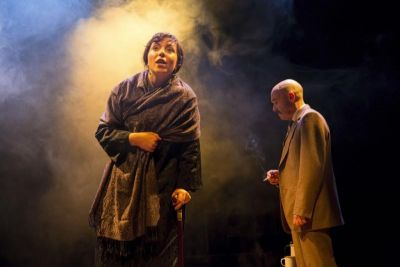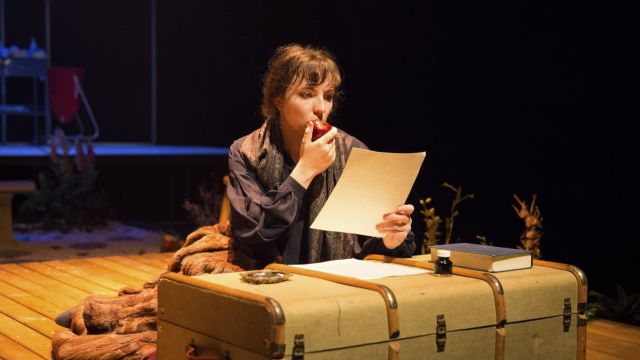The Rivers of China
It begins with a female orgasm via cunnilingus downstage. If that seems sensational, it is both discreet, if unmistakable, and thematically to the point. The power balance is quickly established: the woman (Claudia Tory) has no time or inclination to reciprocate and bluntly tells the young man (Wayne Shute) that they are not going to have a relationship beyond this. She leaves and he screams, ‘I hate you’ after her. For a play that is actually ‘feminist’ in a subtle and imaginative way, this is a startling beginning. But it is feminist in the sense of a yearning for identity and freedom – from confinement, definition, from dependence and the need for male affirmation.
Via some Googling, I learned from a Variety review of the play’s original premiere that this first scene occurs in dystopian future: ‘a fascist, female dominated society [in which] men are subservient, their books are banned, they are orderlies in hospitals where all doctors are women.’ (Debbie Kruger, 30/09/1987) In other words, the tables are turned? Apart from the banned books, and the young man’s later insistence that ‘men can’t write poetry’, which in this production is puzzling, the relationship between the woman (a doctor) and the man (hospital orderly) looks merely contemporary.
There is a scene later where a couple of chaps are shooting a snuff movie with a bound, blindfolded and gagged woman. The ‘point’ is clear, but where the scene fits isn’t – which makes it seem doubly gratuitous.
Apart from that insert, The Rivers of China plays with two time frames. There is the rather fanciful and contrived dystopian future, set mainly in a hospital, in which an experimental ‘plastic surgeon’ (Kim Denman) can remake more than a face and as a consequence an unnamed ‘Man’ (James Cook) believes he is Katherine Mansfield. Toward the end, there is an explanation of sorts for what we’ve seen, but it feels as if Alma de Groen felt obliged to add this hasty sci-fi note to ground her extended metaphor.
Designer Martelle Hunt gives the hospital (the Future) its own elevated space, which is brilliant conceptually, but means that two thirds of the audience, seated either side of the downstage area (the Past) have to twist in their seats to see and the other third – facing both - sometimes have masking problems.
Then there is the story in the past. It is of the real Katherine Mansfield’s last days, before dying of tuberculosis, in the hands of that semi-plausible but charismatic fraud, Georgi Ivanovich Gurdjieff. Ms Hunt’s design for Mansfield’s space– a cow shed, a garden with flowers and gravel paths – is beautifully detailed and the result of imagination and love.
 The scenes in the future reference and depend upon the scenes in the past, the links being ‘Mansfield’, the search and struggle for identity, and a love of language that bonds the Man and the hospital orderly, but it is the scenes at Fountainebleu, Gurdjieff’s ‘institute’, that more deeply engage. Mansfield’s struggle with herself and with the inflexible guru is finely crafted – although why or how a woman of her intelligence and achievement would fall for Gurdjieff’s bunkum and stay there for years is not entirely clear. The fact that she is a published and famous author means absolutely nothing to him. Perhaps Alma de Groen is critiquing a woman’s mistake to place herself in the power of a male authority figure. This is a play of the 80s.
The scenes in the future reference and depend upon the scenes in the past, the links being ‘Mansfield’, the search and struggle for identity, and a love of language that bonds the Man and the hospital orderly, but it is the scenes at Fountainebleu, Gurdjieff’s ‘institute’, that more deeply engage. Mansfield’s struggle with herself and with the inflexible guru is finely crafted – although why or how a woman of her intelligence and achievement would fall for Gurdjieff’s bunkum and stay there for years is not entirely clear. The fact that she is a published and famous author means absolutely nothing to him. Perhaps Alma de Groen is critiquing a woman’s mistake to place herself in the power of a male authority figure. This is a play of the 80s.
Alexandra Aldrich as Mansfield is the undeniable centre of the show; she has that quality of drawing and holding the audience’s caring attention. After her Madame de Merteuil in last year’s Dangerous Liaisons, she clearly has quite a range. Here she registers all the steps of Mansfield’s evolving thoughts and emotions: desperation, incredulity, anger, denial, acceptance, realization and a kind of triumph. Rob Meldrum as Gurdjieff plays it low key: gruff, dogmatic, bullying, brooking no questioning of his authority. The reveal of his attitude to women – not misogynist, but simply, firmly that women are inferior beings – delivered in a calm, matter-of-fact manner, is chilling. When Mansfield matches him, and better yet with humour, it gives us one of the most uplifting (can I say that?) moments of the play.
When we first see Mansfield, she is with her husband, John Middleton Murray (Tom Heath), the literary critic – or parasite on the famous, including his wife, in my book; if you know some literary history, you know that Mansfield’s achievements far outstrip his and yet she must employ ‘feminine wiles’ with him. When he takes her in his arms, it looks more like smothering than comfort – a nice piece of direction. Ms Aldrich renders beautifully a mix of needing to be loved and reassured with fear and a desire to break free.
The audience’s struggle, on the other hand, to get a handle on the story in the future seems to be matched by a struggle for the cast. Despite their obvious ability, there is feeling of forced emotion, of false conviction, perhaps because the writing is straining for meaning rather than making meaning clear. Hence, perhaps, the explosive sound track (Tom Pitts) and dazzling lighting effects (Sian James-Holland) for transitions and punching up the big moments.
The Rivers of China premiered in 1987 at the Sydney Theatre Company and took out a Premier’s Literary Award in 1988 – surely in part for its bold theatricality and its themes. The Don’t Look Away Company continues its commendable program of revivals of ‘classic Australian plays’. Whether this play is strong enough in 2015 for revival is debatable. Director Phil Rouse calls it ‘a delicate, finely-crafted, musical world of infinite emotional depth’ and it is, more or less, those things, but if it is also a coherent and satisfying whole is another matter. There is some graffiti, part of the text, painted on the theatre wall: A MAN’S REACH SHOULD EXCEED HIS GRASP. It’s what the play exhibits: its reach exceeds its grasp. But it is certainly a play which should be applauded for its ambition, daring, insight and poetry.
Michael Brindley
Photographer: George Darsas
Subscribe to our E-Newsletter, buy our latest print edition or find a Performing Arts book at Book Nook.

